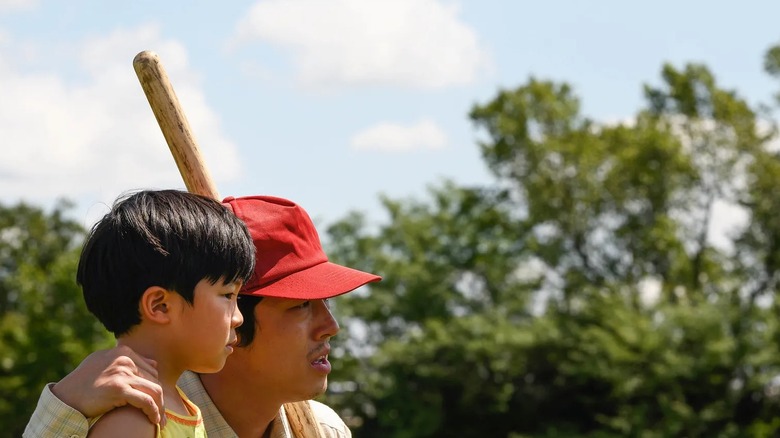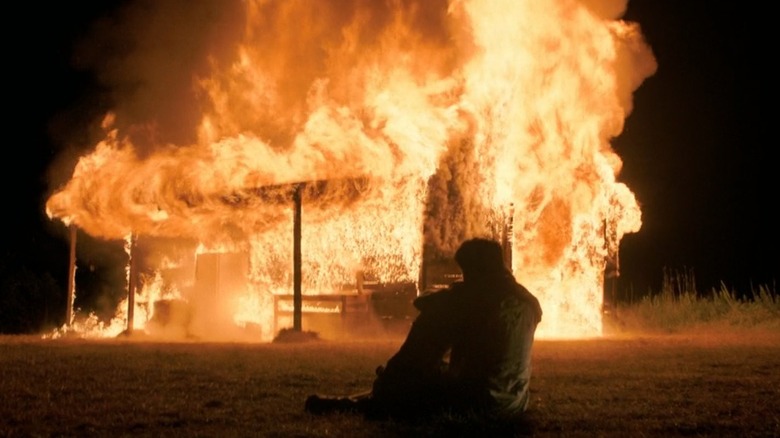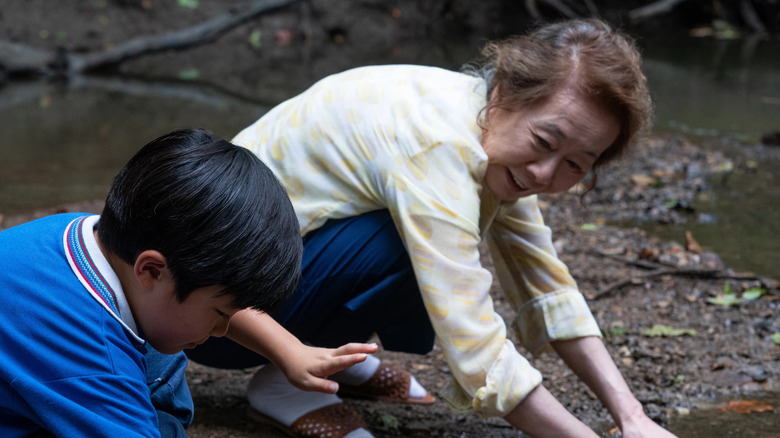Minari's Most Devastating Moment Was Just As Emotional Behind The Scenes
Much of "Minari," director Lee Isaac Chung's sublime reckoning with his adolescence, is an emotionally taut wind-up to its climax. After trying to set down roots — literal and figurative — in Arkansas, the Yi family finds itself strained by a number of crises. Jacob (Steven Yuen) is consumed by the success of his crops — something he understandably ties to his family's flourishing. But his obsession strains his relationship with his wife Monica (Yeri Han) who sees in her husband a reckless lack of consideration for the effect his actions have on their lives. It was by his whim that the family was uprooted from California to Arkansas at all. Tensions also develop between young David (Alan Kim) and his grandmother Soon-ja (Youn Yuh-jung), though she soon wins him over.
As their relationship starts to blossom the family gets some good news: David's heart condition has started to improve. But the relief is fleeting as Jacob and Monica agree to separate, only to return home to find that Soon-ja has unknowingly set fire to the barn with all of Jacob's produce. The scene itself is a lightning rod of catharsis and one that brings together all the separate, seemingly isolated tensions of the Yi family into one harmonizing grief. It's beautiful and heart-shattering, while the family's loving retrieval of Soon-ja never fails to make me weep. Despite being a catastrophe for the Yi family, the scene with the smoldering building is the heart and soul of the film. And as such, it made sense that they had no intention of faking it.
That's a real barn full of produce burning down
We've all heard stories about directors lobbying to skittish producers to really blow up a building, crash that plane, or immolate this house. "Minari" was no different as both Chung and cinematographer Lachlan Milne fought hard to argue the film needed this moment to be real. As the director tacitly noted to The Hollywood Reporter, his film was one without any dramatic action like a car chase.
"This is leading up to a devastating moment, and it needs to be a spectacle," Chung argued. This particular spectacle had a track record after all: the scene feels like a sibling to a similar sequence in the film "Mirror" by Andrei Tarkovsky, another semi-autobiographical film.
But there were other benefits of setting on fire a real building. As Milner put it: "It needed to be visually tragic." It also needed to ignite in the cast, crew, and audience the monumental devastation being inflicted upon the Yi family at this moment, if only to make their momentous rallying behind their matriarch all the more uplifting. There's no doubt in my mind that the crew of "Minari" achieved that singular goal.
So how'd they do it?
It's one thing to envision a scene in which your burn down a real building, it's an entirely other matter to safely execute that stunt. In order to accomplish the task, the crew needed to get permission to have a controlled collapse of the barn and also enlist the expertise of a pyrotechnics expert. As for the footage: that's Milne holding a handheld camera, which was deemed as the best way to capture the intimate reactions of the cast from a safe distance. Especially of Yeun and Han — it's their agony that takes center stage. Yeun said:
"I just stared at the fire, watching all of [Jacob's] work being burned to the ground, and I looked at Yeri and she was sobbing. To have an immersive experience was incredible."
It also probably helped that apparently, the barn burning sequence was scheduled at the very end of a 25-day shoot, which no doubt gave the actors plenty of exhaustion and fatigue to bolster their emotions. Perhaps the only thing more likely to turn my eyes into waterfalls than that scene is Chung's anecdote about his father's reaction to the film: "He came back and we hugged for five minutes. I think he felt that I understood him." Cue the waterworks.


